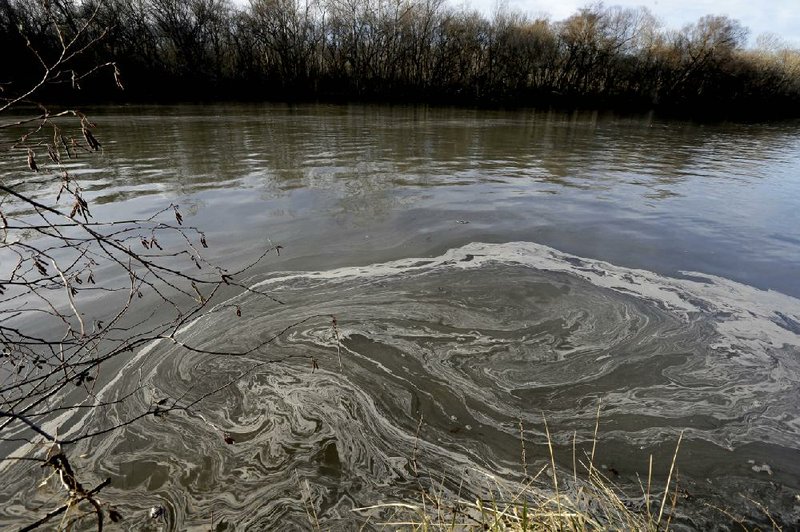RALEIGH, N.C. - During the past year, environmental groups have tried three times to use the federal Clean Water Act to force Duke Energy to clear leaky coal-ash dumps like the one that ruptured last week, spewing enough toxic sludge into a North Carolina river to fill 73 Olympic-sized pools.
Each time, they say, their efforts have been stymied - by the North Carolina Department of Environment and Natural Resources.
The state agency has blocked the citizen lawsuits by intervening at the last minute to assert its own authority under the federal act to take enforcement action. After negotiating with Duke Energy, the state proposed settlements where the nation’s largest electricity provider pays modest fines but is under no requirement to actually clean up its coal-ash ponds.
Clean-water advocates have long complained that state regulators are too cozy with the polluters they regulate. But they say that coordination and cooperation has become even more overt since the January 2013 inauguration of Gov. Pat McCrory, a pro-business Republican who worked at Duke Energy for 28 years.
In the wake of last week’s spill, McCrory touted his track record with Duke Energy over its coal-ash water pollution.
“My administration is the first in North Carolina history to take legal action against the utility regarding coal-ash ponds,” McCrory said, after a private meeting with company officials.
Amy Adams was a regional director at the state environmental agency in charge of enforcing surface-water standards for 21 North Carolina counties before she resigned in protest last November. A nine-year veteran of the agency, she said she was directed in her last months to help polluters meet compliance standards, rather than issue violations or fines.
“We have a governor right now that has very close ties to Duke, the state’s largest polluter and a major political contributor to his campaigns,” said Adams, who now works for the environmental group Appalachian Voices. “Under the new administration, North Carolina has changed the definition of who its customer is from the public and the natural resources it is supposed to protect to the industries it regulates.”
Since his unsuccessful first campaign for governor in 2008, campaign finance reports show Duke Energy, its political action committee, executives and their immediate families have donated at least$1.1 million to McCrory’s campaign and affiliated groups that spent on TV ads, mailings and events to support him.
On the afternoon of Feb. 2, a security guard patrolling the grounds of Duke’s Dan River Steam Station discovered that a pipe running under a 27-acre toxic-waste pond had collapsed. The company reports that up to 82,000 tons of coal ash mixed with 27 million gallons of contaminated water drained out.
The public was not told about the breach until the next day and initial reports provided by Duke and the Department of Environment and Natural Resources did not make clear the scale of the disaster. McCrory made no public comments on the issue for five days, after the spill had grabbed national attention.
Environmental groups and federal regulators had been concerned for years about problems at Duke’s 31 coal ash waste ponds in North Carolina. Environmental groups had long shared water samples from lakes and rivers near the waste ponds with state regulators that showed contamination, but no fines were issued.
So in January 2013, the Southern Environmental Law Center filed a notice of intent to sue Duke Energy in federal court over coal-ash pollution at the company’s Asheville Steam Generating Plant.
The Clean Water Act allows citizen groups to file lawsuits over environmental violations, but it requires them to give 60 days of notice to state regulators to take enforcement action before the case can proceed. On the 58th day after the notice, the Department of Environment and Natural Resources filed notice it would assert its jurisdiction.
On March 26, the Southern Environmental Law Center sent another notice for contamination from coal-ash lagoons at the Riverbend Steam Station in Gaston County. On the 60th day, state regulators again intervened.
On June 19, the legal group once again sent a 60-day notice to sue Duke over coal ash pollution leaking from Duke’s Sutton Power Plant near Wilmington.
Once again, state regulators filed an enforcement action against Duke on the very last day. This time, however, the state also filed enforcement actions for all of Duke’s remaining coal-ash sites in North Carolina, which effectively blocks environmentalists from pursuing action against them under the Clean Water Act.
Meanwhile, the state announced a deal with Duke to settle the litigation involving the Asheville and Riverbend sites.
The state proposed that Duke pay $99,111 to settle the environmental violations at Asheville and Riverbend. Environmentalists criticize the proposed fines as couch-cushion change for a company valued at nearly $50 billion.
“This is a common technique of regulators who are friendly with the law-breaking regulated entities,” said Frank Holleman, a senior attorney at the Southern Environmental Law Center. “They will come in and file at the very last minute and then quickly propose a favorable settlement to the lawbreaker to prevent the citizens group from leading the litigation.”
In a written statement, Duke said it is committed to closing the ash basins at “many” of its 14 coal plants across North Carolina that are no longer being used, including the Dan River facility. While it is studying the issue, however, Duke said it has no timetable for removing the waste from its leaky unlined ponds.
A state judge in Charlotte must still approve the state’s agreement with Duke before it can be finalized.
Front Section, Pages 4 on 02/10/2014
